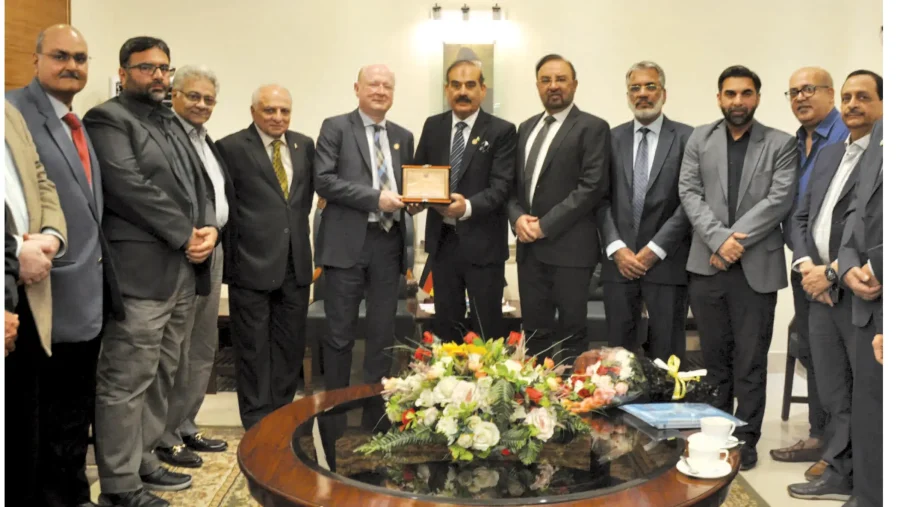Consul General of Germany Dr. Ruediger Lotz has said that the textile sector was very important when it comes to bilateral trade as 85 percent of Pakistan’s exports to Germany comprises of textile products which, although was wonderful thing, but the exports need to be diversified to further improve the existing trade volume. Exchanging views at a meeting during his visit to the Karachi Chamber of Commerce & Industry (KCCI), German CG said that Pakistan’s textile industries were being run by highly trained professionals who have been producing good quality products.
“I am also very impressed to see the economic importance of Karachi which generates tax income for the whole country”, he added. President KCCI Iftikhar Ahmed Sheikh, Senior Vice President Altaf A. Ghaffar, Vice President Tanveer Ahmed Barry, Former President Majyd Aziz and KCCI Managing Committee Members were also present on the occasion. Commenting on concerns expressed over delays in issuance of visas, German Envoy said that he was aware of the problem which was due to enhanced number of visa applications. “We have about twice as much applications as we had some five years ago before COVID but the number of staff is the same who could only process a certain amount of visa applications per day.
I ask my staff to give preference to students and businessmen seeking visa appointments.” “Around 4,000 Pakistani students are currently studying in Germany which sounds nice but I think the number should be much higher. There are typically two hurdles, of which the first one is the legal requirement asking students whether they can afford to stay in Germany for three to four years or not that means you have to prove that you have 12,000 euros in your bank account which is quite a lot of money for many people while the second one is the language barrier”, said Dr. Ruediger, adding that the biggest advantage of studying in Germany was the free education as there was no tuition fee which was something very different from US and UK. Replying to query regarding commencement of Volkswagen operations in Pakistan, he said that the production of Volkswagen here suffered delays due to restriction on imports imposed one-and-a-half year ago.
The vehicle manufacturing company was not allowed to bring necessary machinery which stalled the project. “Even if the Volkswagen is allowed to bring the machinery now, it would take at least one and half year more to start production. At the moment, it is unclear whether Volkswagen would pursue the project further or not which would be a pity but it is one of the negative results of the economic problems of Pakistan. I am regularly in contact with the person responsible for international affairs in Volkswagen but I think at the moment, they are yet to decide how to pursue this project”, he added. President KCCI Iftikhar Ahmed Sheikh, while welcoming the German CG, noted that Pakistan and Germany have been enjoying warm friendly bilateral diplomatic ties since 1951 and it was heartening to see that Germany was keen to strengthen social, political and economic bilateral relations with Pakistan, besides having great interest in regional stability for the sustainable economic development.
He informed that Pakistan’s exports to Germany stood at $1.60 billion in FY23 compared to $1.75 billion in FY22, which represents a drop of 8.62 percent year-on-year basis. “Both countries need to reduce trade barriers, diversify the range of products, simplify customs procedures, promote SMEs, and foster business collaboration to give a much-needed trade boost for economic integration.
“The Technology transfer from German Investors for setting up joint ventures and shifting towards high-value-added exports, will boost the productivity and the competitiveness of the country”, he opined, adding that China Pakistan Economic Corridor (CPEC) was a lifeline project for Pakistan’s economy, which could offer tremendous opportunities to German investors who can invest in Special Economic Zones (SEZs) to easily penetrate in this entire region whereas considerable potential for German investment exists in varying sectors like dairy, agriculture, textiles, IT, pharmaceuticals, electrical machinery, power generation, infrastructure, oil & gas sectors etc.










